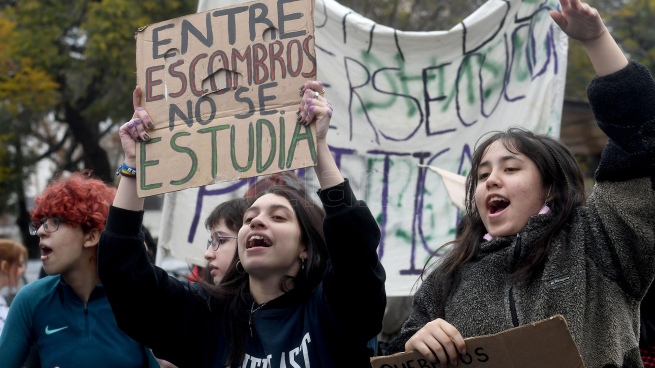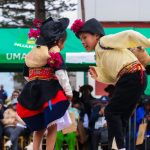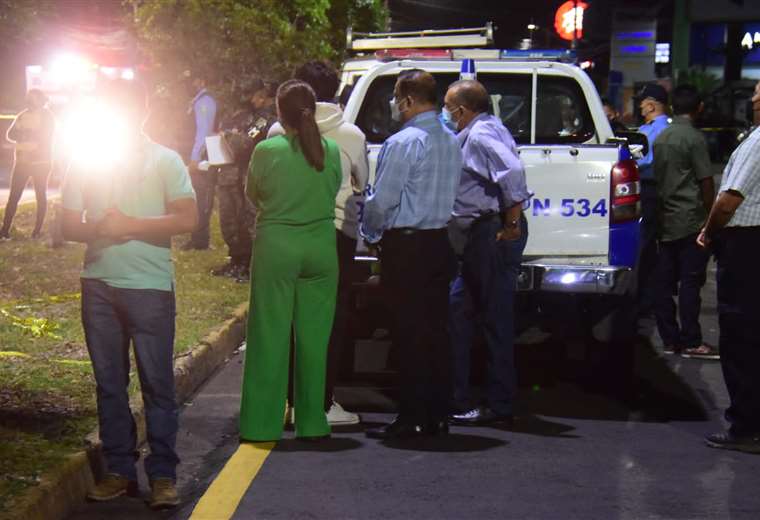students from different art schools held a protest this Thursday to demonstrate in against the Buenos Aires Ministry of Education and the authorities of the Government of the City of Buenos Aires (GCBA) regarding the ban on the use of inclusive language in schoolsthe opposition to compulsory internships (ACAP), the educational budget cut, the quality of food in schools and school building conditions.
Valentina Mencia, a student and member of the Rogelio Yrurtia (Cebary) student center, explained that part of her claims have to do with improvements in building conditions.
“We have one gas leak and no one came to fix it. The school is falling aparts, the electrical connection is bad, the plugs don’t work, there are bare cables that fall on the ceiling, the stairs don’t have sunlight and the burned-out lights don’t change,” he explained, adding that “on the one hand it’s the building conditions and, on the other, the conditions of the food,” he asserted.

“Every day we get a sandwich and a piece of fruit. The fruits come either very ripe or rottens, and the sandwiches taste a lot like plastic, which was never the case before. Less and less quantity and more boys are coming, “he explained in dialogue with Télam.
And he added, “beyond the food we want free canteens in all schoolsIt’s because kids wouldn’t have to choose whether to go to school or eat.”
On the other hand, part of the claim that was made present has to do with the Approach Activities (ACAP) proposed by the Buenos Aires government, in which fifth-year secondary school students participate, both state and private, whose objective is to introduce students to the world of work through an internship system that began to be implemented this year in some schools and will begin in a compulsory way from next year.
“For internships they want to add class hours to send us to work, and the main problem is that the work is free and there is no possibility of remuneration for that. It is free labor,” said Mencia.

“In some schools, for one of the ACAP they had to go to make food for other schools. They end up cutting class hours and they don’t recognize your per diem,” he concluded.
For her part, Lucia Rinaldi, a student and member of Cebary, explained to Télam that the claim stems from “the low blows that the Ministry of Education of the City of Buenos Aires is giving us,” and considered that “You cannot study if they are directly taking us out of the classroom to go to work for public or private companiesyes It’s child labour, it’s a crime.”
“ACAPs are planned so that they do not have to pay employees and get the kids out of the classroom to go to work,” he said.
Regarding the conditions of the food that they receive in schools, Rinaldi explained that the food is sandwiches that “you do not know what they have. They do not fill, they are diminutive, they can have fungi, hair, and they are not nutritious.”

Meanwhile, regarding the CABA resolution to ban the use of inclusive language in schoolsRinaldi said that it is an “absurd” measure and that “it is denying the identity of a lot of our comrades and violating their right to who they want to be.”
In addition, he also explained that it is persecution for teachers, who “cannot give their opinion, because otherwise they may have problems.”
“We want basic instructions that are needed to be able to study in a decent place and in a school with adequate conditions to be fulfilled,” Jeremías Bianchi, vice president of the Fernando Arranz school, told Télam.
“Although it is a mobilization that the Jorge Donn dance school began, with Fernando Arranz, we plan to continue fighting between artistic and technical schools and any school that wants to join in this type of mobilization. We got schools like Yrurtia, Arranz , or Technique 27 join the mobilization”.
Bianchi, for his part, assured that they need spaces in “adequate conditions.”
And he stressed the need for a “study without the endless noise of workers and their dust and, above all, the need for the dissemination of what education is today in the City of Buenos Aires,” he concluded.
















